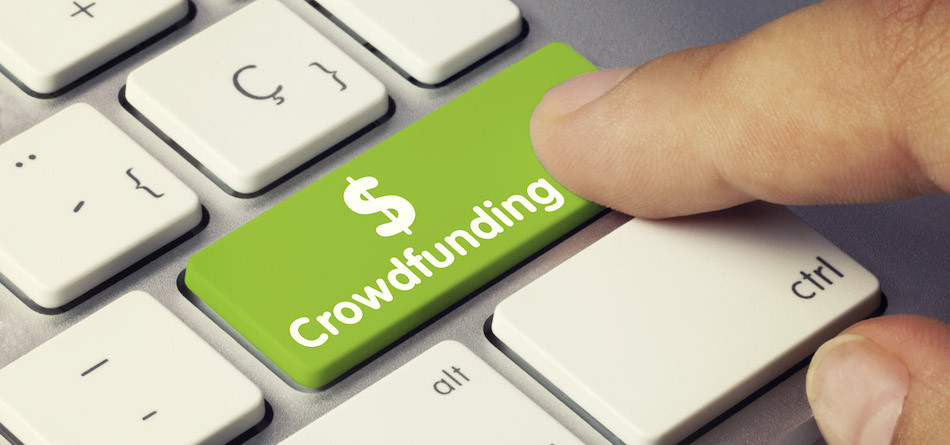Crowdfunding Platforms - Best Sites For Your Next Fundraiser
Crowdfunding platforms have become essential for raising money across a spectrum, from new product launches to medical debt and scientific research. However, with the proliferation of crowdfunding platforms nowadays, finding the one that aligns with your unique needs can be a challenge.
Author:Stefano MclaughlinReviewer:Luqman JacksonJan 14, 20246.5K Shares92.6K Views

Crowdfunding platforms have become essential for raising money across a spectrum, from new product launches to medical debt and scientific research. However, with the proliferation of crowdfunding platforms nowadays, finding the one that aligns with your unique needs can be a challenge.
We've put together a list of important things to think about when browsing the wide range of crowdfunding platforms to help you make an informed choice. With this knowledge at hand, you'll be more qualified to choose, with assurance, the best platform for your unique crowdfunding needs.
What Is Crowdfunding?
Crowdfunding involves raising small amounts of capital from a large number of individuals to fund a new business venture. This method leverages the widespread reach of social media and crowdfunding platforms, facilitating the connection between investors and entrepreneurs. By tapping into extensive networks, crowdfunding can boost entrepreneurship by broadening the investor base beyond conventional sources like owners, relatives, and venture capitalists.
How Crowdfunding Works
Securing capital is a vital element for the advancement of any business. Larger, established corporations often find it relatively straightforward to attract investments or acquire additional funding from lenders. However, smaller companies and startups may encounter obstacles impeding their growth. This is where crowdfunding proves invaluable.
Crowdfunding offers entrepreneurs the chance to raise substantial amounts, ranging from hundreds of thousands to millions of dollars, from a diverse pool of potential investors. It serves as a platform where anyone with a compelling idea can present it to eager investors.
An illustrative example of crowdfunding success involves an individual seeking funds to create a new potato salad recipe. Despite setting a modest fundraising goal of $10, this project garnered over $55,000 from 6,911 backers. Investors have the flexibility to choose from numerous projects and contribute amounts as minimal as $10. Crowdfunding platforms generate revenue by taking a percentage of the funds successfully raised.
Types Of Crowdfunding
The term "crowdfunding" has two primary traditional applications: one involves startup companies seeking financial support to introduce a new product or service, while the other pertains to individuals facing emergencies.
People dealing with the aftermath of natural disasters, significant medical expenses, or unfortunate incidents like house fires have found financial relief through crowdfunding platforms. These platforms provide a means for individuals to access support that might otherwise be unavailable.
In recent times, crowdfunding has expanded its scope with platforms like Patreon and Substack. These platforms have broadened the concept of crowdfunding, offering a sustainable income source for creative individuals such as artists, writers, musicians, or podcasters. This evolution allows these creators to continue their creative endeavors by receiving ongoing financial support.
Advantages Of Crowdfunding
Crowdfunding offers a notable advantage to both start-up companies and individuals by providing access to a broader and more diverse pool of investors and supporters. The prevalence of social media has made crowdfunding platforms an exceptional avenue for expanding audience reach and securing the necessary funding.
The rising popularity of equity-based crowdfunding is evident, particularly for start-ups aiming to raise capital without relinquishing control to venture capital investors. This method also presents investors with the chance to gain an equity position in the venture. In the United States, the Securities and Exchange Commission (SEC) oversees and regulates equity-based crowdfunding.
Disadvantages Of Crowdfunding
Crowdfunding presents potential drawbacks, including the risk of reputational harm to you or your company due to the perception of "resorting" to crowdfunding. There are fees associated with using crowdfunding platforms. On some platforms, if you fall short of your funding goal, pledged finances are returned to investors, resulting in no funds being received for your project.
How To Compare Crowdfunding Platforms
If you're curious about how crowdfunding operates, the concept is straightforward: an individual initiates an online fundraiser to meet a financial need, and then their network of friends and family contributes to the cause.
The process typically involves the organizer withdrawing the donations, which are then transferred to their bank account. Here are key aspects to consider when evaluating online fundraising platforms:
- Ease of use - Before launching a fundraiser, explore the crowdfunding platform's site. The best platforms are user-friendly, encouraging you to spend time on their pages, learn more, and engage. Opt for a platform that doesn't involve a complex initiation process.
- Customer support - Check the available customer support options, such as email support, live chat, or a phone helpline. Given that friends and family members will be contributing money, the platform should prioritize honesty, responsibility, and availability, ensuring a positive experience for donors.
- Tools for spreading awareness - Examine the social networking tools provided by the crowdfunding site. Top platforms offer user-friendly tools to share fundraisers on various social media platforms, including Facebook, Instagram, and email. As your social network is crucial for reaching your audience, these features are essential.
- Crowdfunding fees comparison - Be aware of platform fees, where a percentage of the funds raised is taken by the crowdfunding site. Typically ranging from 5% to 12%, some platforms may have punitive fee structures, increasing fees if you fall short of your goal. Others may follow an all-or-nothing model, releasing funds only if you meet or exceed your goal.
- Brand recognition and trust - Consider the reputation of the crowdfunding website. Well-known platforms are more likely to instill trust and loyalty in users. A familiar brand inspires confidence in the product or service, indicating the company's honesty and other positive attributes.
Crowdfunding Platforms For Education
DonorsChoose
DonorsChoose is a nonprofit crowdfunding platform that facilitates streamlined online fundraising for classrooms in need throughout the United States. Public school teachers utilize the platform to craft requests for various classroom projects. In terms of fees, third-party payment processing incurs charges of 1.5%, representing the weighted average across all payment methods employed by donors.
Also, credit card or PayPal donations are subject to a fee of approximately 2.5%. It is noteworthy that the platform itself does not charge any fees; instead, voluntary donations to the nonprofit cover operating expenses.
GiveCampus
GiveCampus partners with colleges to empower students, alumni, parents, and faculty by launching fundraisers dedicated to school-related projects. The funds generated through these campaigns directly benefit the respective educational institutions.
GiveCampus also offers a volunteer management system to enhance engagement. As for fees, schools have the option to subscribe to GiveCampus every month, and interested institutions can reach out to obtain a personalized quote.
Piggybackr
Piggybackr provides a dedicated school fundraising platform, allowing parents and students to collaboratively or individually raise funds for various school projects. Students are incentivized through a point-and-badge system based on their fundraising efforts. In terms of fees, Piggybackr imposes a platform fee of 4%, along with a 2.9% plus $0.30 per transaction charge for payment processing.
Crowdfunding Sites For Individuals And Nonprofits
GoFundMe
GoFundMe stands as a widely recognized and trusted social fundraising platform catering to individuals, teams, and nonprofits, boasting a global giving community exceeding 100 million members. Recognized as one of the premier crowdfunding sites for personal fundraising, GoFundMe has successfully raised over $15 billion. It offers the exclusive GoFundMe Giving Guarantee, the first and only donor protection guarantee in the industry.
GoFundMe provides a dedicated customer care team, offering support at every stage of the fundraising journey. In the United States, there is no initial fee to start or manage a fundraiser on GoFundMe. However, a transaction fee of 2.9% plus $0.30 is automatically deducted from each donation.
FundRazr
FundRazr facilitates crowdfunding for individuals, nonprofits, and companies, allowing them to raise funds for causes close to their hearts. The platform offers flexibility with both keep-it-all and all-or-nothing fundraising models, where access to funds is contingent on reaching the specified goal.
Individuals can opt for a fundraising model with no platform fee (optional tips encouraged from supporters), while organizations can choose between a "Standard" model (5% platform fee plus payment processing fee) and a "Pro" model with flexible fees for both platform and payment processing.
Fundly
Fundly caters to both individuals and nonprofits, providing a platform for creating digital fundraisers across diverse causes, including fraternities and sororities, military initiatives, and political campaigns. Fundly stands out with its absence of a platform fee, charging only a payment processing fee of 2.9% plus 30 cents. The credit card processing fee varies for Stripe and international fundraisers.
Classy
Classy positions itself as an online fundraising site designed specifically for nonprofits and social enterprises. The platform includes a fundraiser reporting tool for tracking progress and features to help teams organize virtual events, including ticketing and registration.
While the platform doesn't disclose pricing for its plans, users can contact the site for a quote. There are fees associated with using Classy Pay, the nonprofit payment processing service, with transaction costs varying based on the type of credit card used, typically processed at 2.2% + $0.30 per transaction.
Crowdfunding Sites For Creative Projects
Kickstarter
Kickstarter serves as a platform for creators seeking funding for specific projects, offering a means to bring their ideas to life. A diverse range of creators, spanning individual designers to large corporations testing new product concepts, entices backers with rewards.
These rewards may include a stake in the project, access to initial prototypes, or the resulting products. Fundraising on Kickstarter follows an "all or nothing" model, meaning the creator must secure the full funding amount or receive nothing.
Kickstarter imposes a service fee of 5%, coupled with a payment processing fee of 3% plus $0.20 per transaction. For micropledges under $10, there is a discounted fee of 5% plus $0.05 per pledge.
Indiegogo
Indiegogo offers comprehensive support at every stage of creative or entrepreneurial projects, providing tools for pre-launch, crowdfunding, and distribution. Users can opt for either an all-or-nothing fundraising approach or flexible funding based on their project's needs.
The platform fee on Indiegogo is set at 5%, and a payment processing fee of 3% plus $0.20 per transaction applies. There is an international transfer fee of $25 for funds sent to banks outside of the United States.
Patreon
Patreon enables users to build fundraisers focused on gathering recurring patronage for artistic or creative projects through monthly subscriptions from fans. Patreon encourages creators to offer rewards to patrons as a way to express gratitude for their support.
Patreon offers two plans: Pro and Premium, with fee percentages of 8% and 12%, respectively, deducted from the income earned on the platform. Additional fees cover payment processing, currency conversion, payout processing, and any applicable taxes.
Crowdfunding Sites For Business
Fundable
Fundable stands out among the crowdfunding sites tailored for startups, entrepreneurs, and companies seeking capital through business crowdfunding. The platform enables users to present either rewards or equity in exchange for financial backing. To use Fundable for fundraising, there's a monthly fee of $179 and a transaction fee of 3.5% plus $0.30 per transaction for merchant processing.
WeFunder
WeFunder is a platform designed to aid the growth of existing businesses by facilitating funding. Investors on WeFunder receive a small stake in the company, fostering a sense of emotional investment in the business's success.
While starting a company profile on WeFunder is free, the platform charges a service fee. For Reg CF (Regulation Crowdfunding), there's a 7.5% charge on the total amount raised, applicable only if the fundraiser is successful. For Reg A+, a flat fee of $375k is charged.
EquityNet
EquityNet serves as an equity crowdfunding platform connecting entrepreneurs with accredited investors, including venture capitalists and angel groups, to raise capital. EquityNet offers subscription models ranging from "Starter" (free) to "Full Service." The "Premium DIY" model costs $299 per month, while the "Full Service" option is priced at $2,990 per month.
SeedInvest
As an equity crowdfunding platform, SeedInvest facilitates fundraising for startups from individual investors and venture capital firms. Before investments become final, entrepreneurs must achieve minimum funding goals.
SeedInvest imposes a 7.5% placement fee, along with 5% warrant coverage or equity. There's also a fee ranging from $0 to $10,000 for escrow, marketing, and legal expense reimbursements.
Real Estate Crowdfunding Sites
PeerStreet
PeerStreet, functioning as a donation website, offers private real estate loans exclusively to accredited investors. Demonstrating a commitment to transparency, the platform allows users to review and scrutinize past investments.
The loan duration typically ranges from six to 24 months, with a loan-to-value ratio usually staying below 75%. A servicing fee of 0.25% to 1% is applied to the total loan amount.
RealCrowd
Specializing in commercial real estate equity investments, RealCrowd seeks to streamline real estate investing by eliminating intermediaries. Accredited investors have the opportunity to browse, compare, and make investments through the platform. RealCrowd imposes a base listing fee of $15,000, along with varying investor processing fees.
RealtyMogul
RealtyMogul brings users together to invest in both residential and commercial real estate. Both accredited and non-accredited investors can participate on the platform.
Each investment incurs a fee, varying based on whether it involves a loan or an equity purchase, making RealtyMogul a robust choice in the realm of real estate crowdfunding sites. The minimum investment varies for each opportunity but can be as low as $5,000.
Niche Crowdfunding Sites
Honeyfund
Honeyfund caters to engaged couples or newlyweds embarking on the next chapter of life, providing a crowdfunding platform to raise funds for various purposes, including weddings, honeymoons, or even the down payment on a new home.
No fees apply for gift cards. For cash gifts, funds are automatically deposited into the user's bank or PayPal account, incurring a fee. There is a fee of 3.5% plus $0.59 when using a Stripe-powered bank account.
Slated
Slated operates as an equity crowdfunding site specifically tailored for movies. This end-to-end platform assists in funding film projects, discovering talent, and managing the distribution of the final project.
Services, such as script and financial analysis, are available at an extra cost. If users secure a distributor or sales agent with Slated's assistance, the platform charges a fee of 4% of gross sales, along with an "In Association With Slated" front card and end credit.
Experiment
Experiment is a dedicated crowdfunding site for scientific research, supporting researchers in raising funds for new discoveries and technology. Backers gain insight into their impact through open access to data and resulting journal publications.
Experiment imposes a platform fee of 8%, coupled with a payment processing fee of 2.9% plus $0.30. The fundraising model offered is strictly all-or-nothing.
Crowdfunding Platforms - FAQ
Do You Pay Back Crowdfunding?
There are websites specifically for these types of campaigns. While crowdfunding websites take a percentage of the money raised as a fee, crowdfunding donations don't have to be repaid like a loan.
How Do You Make Money From Crowdfunding?
Depending on the type of crowdfunding, you could potentially earn returns on your investment via equity (growth in share value) or interest (if using P2P lending), or you might simply receive other perks or benefits.
How Long Does It Take To Get Money From Crowdfunding?
If your project is successfully funded, the funds pledged will be debited directly from your backers' cards. There is a 14-day window following your project's deadline where we will be collecting and processing the pledges. After the 14 days have passed, a payout will be initiated.
Wrapping Up
One easy and quick way to get money for your next fundraiser is to use a crowdfunding platform. However, you must determine which crowdfunding platforms are most suited to your business and its unique needs. Use this list of the top crowdfunding sites to find the one that works best for your campaign or project.
Jump to
What Is Crowdfunding?
How Crowdfunding Works
Types Of Crowdfunding
Advantages Of Crowdfunding
Disadvantages Of Crowdfunding
How To Compare Crowdfunding Platforms
Crowdfunding Platforms For Education
Crowdfunding Sites For Individuals And Nonprofits
Crowdfunding Sites For Creative Projects
Crowdfunding Sites For Business
Real Estate Crowdfunding Sites
Niche Crowdfunding Sites
Crowdfunding Platforms - FAQ
Wrapping Up

Stefano Mclaughlin
Author

Luqman Jackson
Reviewer
Latest Articles
Popular Articles

